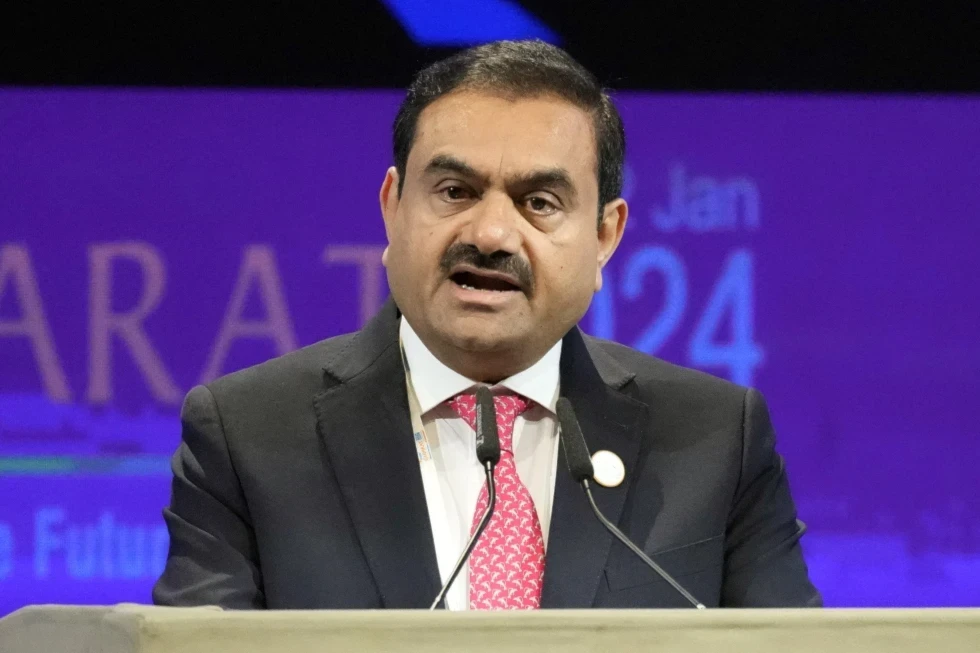India's Adani pauses $10 billion deal with Israeli semiconductor firm
According to Reuters, Israeli firm Tower Semiconductor and Indian billionaire Gautam Adani's enterprise group have paused talks on a $10 billion chip project, raising questions about "Make in India" semiconductor ambitions.
-

India’s Adani Group Chairman Gautam Adani addresses the Vibrant Gujarat Global Summit in Gandhinagar, India, Jan.10, 2024. (AP Photo/Ajit Solanki)
"Israel's" Tower Semiconductor and Indian billionaire Gautam Adani's Adani Enterprises have paused talks on a $10 billion chip project, according to Reuters. A close ally of Indian Prime Minister Narendra Modi, Adani ranks as the 21st richest person globally with an estimated fortune of $77 billion.
The proposed project, intended to establish a wafer fabrication facility in Maharashtra, was seen as a flagship contribution to Modi’s “Make in India” initiative.
The project, announced in September 2024, was to produce 80,000 wafers per month and generate an estimated 5,000 jobs. It was one of several high-profile efforts aimed at addressing India's lack of domestic chip production capacity.
According to Yahoo Finance, Tower Semiconductor Ltd. is an analog semiconductor foundry, offering advanced and customizable process platforms such as SiGe, BiCMOS, RF CMOS, CMOS image sensors, power management, photonics, and MEMS for sectors including automotive, industrial, medical, and defense, with facilities in "Israel", the US, Japan, and Italy.
Modi’s 'Make in India' push for 'Aatmanirbhar Bharat' (Self-Reliant India)
Sources close to the matter told Reuters that Adani Enterprises opted to pause the partnership after an internal review concluded the deal lacked strategic and commercial justification. A key concern was the uncertainty around demand in India, which remains relatively low compared to major global semiconductor markets like China.
“It was more of a strategic decision. Adani evaluated it and decided, let’s wait,” one source told Reuters. Another added that the conglomerate was dissatisfied with the level of financial commitment from Tower Semiconductor.
While Tower was expected to bring in technological expertise, Adani had reportedly expected more significant capital input, with one source saying, “Adani wanted Tower to have more skin in the game.”
On the other hand, under India's 'Semicon India' program, the government has allocated ₹76,000 crore (approximately $10 billion) to boost semiconductor and display manufacturing, with over $20 billion in investments already committed by IESA members and global firms, according to SEMI IESA President Ashok Chandak, Reuters said.
However, earlier this month, Chandak stated on X that China's rare earth restrictions could disrupt global semiconductor and electronics supply chains. While short-term impacts are unlikely due to existing inventory, he warned of mid- to long-term risks across industries. He compared the situation to the Russia-Ukraine war's effect on neon gas supplies, where alternative sourcing helped avoid a crisis.
VIDEO | Ashok Chandak, President of the India Electronics and Semiconductor Association (IESA), acknowledged the potential for global supply chain disturbances, particularly for the semiconductor and electronics sectors.
— Press Trust of India (@PTI_News) April 18, 2025
Ashok Chandak said, "We know that China has recently put… pic.twitter.com/8uzFue8XF4
Reuters also noted that the strategic alliance between SEMI (Semiconductor Equipment and Materials International) and IESA (India Electronics and Semiconductor Association) aligns with the 'Aatmanirbhar Bharat' (Self-Reliant India) vision, despite the growing challenges in the semiconductor industry.
India’s economic strategy faces market reality check
The suspended talks reflect deeper structural concerns about India’s economic strategy in high-tech manufacturing. India currently has no operational semiconductor fabrication plant. A similar $19.5 billion joint venture between Vedanta and Taiwan’s Foxconn collapsed in mid-2023 due to regulatory delays and rising costs.
Back in 2023, the US and India signed a Memorandum of Understanding, where they agreed to establish a semiconductor subcommittee to help develop stronger ties between the industries of both companies and create a supply chain connecting the relative chip sectors.
Though Modi has made semiconductors central to his industrial strategy, converting policy ambition into viable infrastructure has proven difficult. Adani’s hesitance shows growing caution among private sector leaders about the profitability and feasibility of chipmaking ventures in the country.
“The project required further evaluation about how does India make sure chips manufactured are sold in India,” one source told Reuters. “The market is still nascent.”
Global semiconductor demand leaves India trailing
Despite government incentives and global investments, India lags significantly in global semiconductor consumption. A recent UBS report found that the United States and China together account for 54% of global semiconductor demand. In contrast, India’s share is just 6.5%, limiting local market opportunities for chipmakers.
Other major Indian semiconductor projects are still in development. Tata Group is working on an $11 billion chip fabrication and testing facility, and US-based Micron is building a $2.7 billion chip packaging unit. However, Adani Enterprises’ withdrawal from its proposed collaboration with "Israel's" Tower Semiconductor reflects ongoing concerns about the long-term demand, infrastructure readiness, and return on investment.
As the global race for semiconductor dominance continues, India’s ambitions face a critical test, not only in attracting investment but also in proving the sustainability of its semiconductor market.

 5 Min Read
5 Min Read








